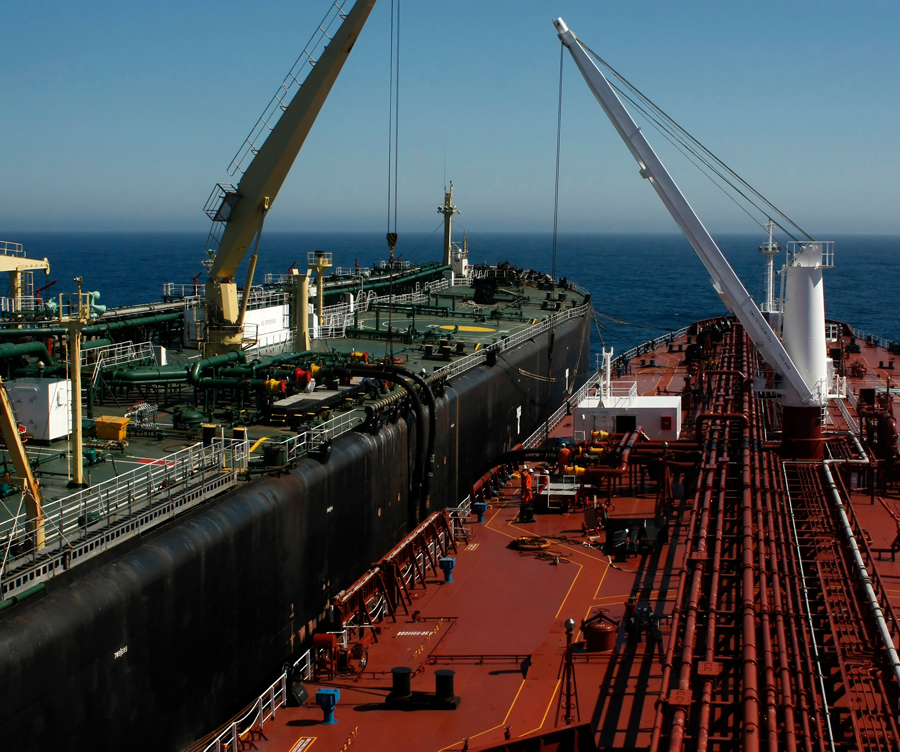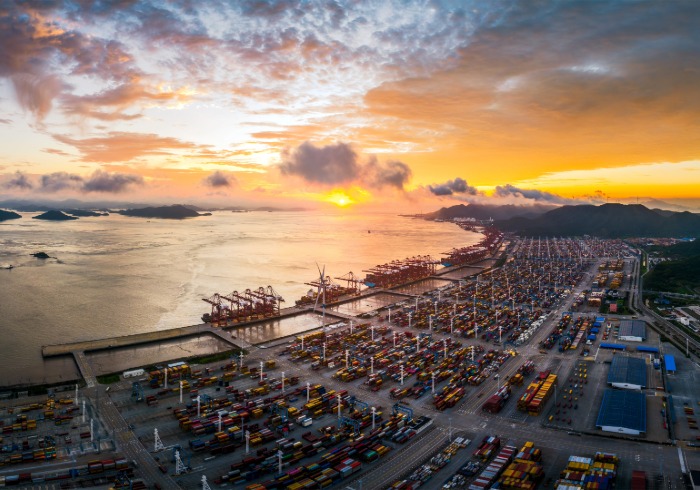The waters off the coast of Oman have emerged as one of the most popular locations for ship-to-ship transfers of Russian energy cargoes this year, putting trade finance banks on notice to scrutinise trade documents that list the Omani port of Sohar.
Clandestine transfers of crude oil and other energy products from one vessel to another are used to disguise the Russian origin of cargoes and skirt the oil price cap imposed by the US and its allies.
Sohar, a port along Oman’s lengthy coastline around 200 kilometres northwest of the capital Muscat, has leapt up the rankings of ship-to-ship transfer hubs after the EU cracked down on the practice in the Mediterranean, industry data shows.
Omani waters have consistently featured as a prominent location for transferring Russian crude between vessels since February this year, according to S&P Global data. Oman, Egypt and South Korea were the primary locations for the trade in August this year, the organisation’s data suggests.
The International Maritime Bureau (IMB), which investigates suspicious shipping documents on behalf of trade finance lenders and insurers, says Sohar has become the “favoured place” to conduct ship-to-ship transfers.
“The [bills of lading] presented for these shipments usually refer to the load port as offshore Sohar or similar and could be perceived as a red flag from a sanctions and compliance perspective,” the IMB says in a quarterly fraud trends report issued to its members.
The IMB has recorded a “marked decrease” in the number of bills of lading for ship-to-ship transfers in European waters, since countries such as Spain and Greece have tried to curb the activity.
Sohar is only a short trip from the west coast of India, which has been the second-biggest buyer of Russian-origin crude oil this year. In March, major Indian refineries began refusing to accept shipments borne by sanctioned Russian shipping giant Sovcomflot, Bloomberg reported, potentially fueling the demand for using one vessel to export cargoes from Russia and then transferring them to another vessel to discharge the oil in India.
Because Greek vessel owners are now “largely out of the picture” of carrying Russian oil, “a larger share is now being lifted by unknown firms which have been set up since 2022”, according to Byron McKinney, product management director for trade finance and compliance solutions at S&P Global Market Intelligence.
“Many of these are operating in Sohar and Egypt,” he says.
Many vessels deploy typical tactics seen by the “shadow fleets” of Russia, Iran and North Korea, such as turning off transponders or manipulating the signals they broadcast to disguise their true identities or locations.
But some ships are conducting the transfers openly, McKinney tells GTR.
“There are still instances of cargo being transshipped fully lit up and visible,” he says. “One example in late July saw a vessel load in northern Russia and conduct a STS [ship-to-ship] openly in Sohar with a ship returning from India. After the STS, the daughter vessel sailed to India where it discharged its cargo.
“Potentially, if you conduct this type of operation in fully lit up mode, the trade could be within the price cap limitation. The most shady of shipments are generally those completed using spoofing and dark techniques.”
Ship-to-ship transfers are also used in regular shipping operations and are not necessarily linked to sanctions evasion.
Much like its neighbour the United Arab Emirates, Oman has maintained friendly relations with Russia since its February 2022 invasion of Ukraine. In June, Oman was the “chief guest” at the St Petersburg International Economic Forum, Russia’s answer to the annual Davos forum for the global business and political elite, according to a statement from the Russian senate.
Russia made around €219mn per day from seaborne crude oil sales in July, the Centre for Research on Energy and Clean Air estimates, continuing a slight downward trend since April. The top buyers since 2023 have been China, India, the EU and Turkey.
Russia, via Turkey
Turkey is also playing a key role as a transshipment hub for Russian exports and imports, the IMB says.
“The shipment is often booked with two different logistics providers, with the main shipping line unaware the cargo is ultimately going from/to Russia,” the IMB warns banks in its report. “Traders are going to great lengths to hide the Russian nexus and the importance of verifying presented documents cannot be stressed enough.”
The bureau is seeing “a noticeable and concerning increase” in bills of lading for bulk coal shipments that list the loading port in Turkey, when the cargo was actually exported from Russia. Turkey is also a major conduit for Russian-origin oil reaching the EU, researchers warned in May.
Just over half of “misrepresented” bills of lading referred to the IMB by banks between April and June concerned trade with Iran, widely sanctioned by the US in a stand-off over Tehran’s nuclear programme and its support for regional militant groups such as Hezbollah.
The IMB defines a misrepresented bill of lading as one where “material facts on the document have been wilfully misrepresented in a deliberate attempt to disguise the true origin or destination of the shipment, usually related to sanctions”.
The most common goods on misrepresented Iranian export bills were steel products and bitumen. Imports were mainly agricultural products, ceramics and marble shipped from China and India bearing the discharge port of Jebel Ali in the UAE, but actually destined for Iran.
Just under a third of misrepresented documents seen by the bureau during the period concerned agricultural exports from Myanmar, another widely sanctioned jurisdiction. Documents relating to Russian trade accounted for 15.7% of the total.







